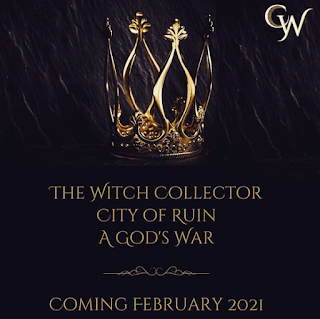So exciting! DARK WIZARD, Book #1 in a totally new series - new world, new magic system, new everything! - is coming February 25, 2021. You can preorder now.
Available at these Retailers
Yes, I know I just released a book last week, but sometimes this is how balancing an Indie career with a Trad one works out. Probably we could do a theme week on that topic. Suffice to say, I'd already planned out and begun the Heirs of Magic series, when this book - finished and very sparkly to my eye - was returned to my aegis. I could have sat on it. Or I could just launch this series, too!
You all know me (or you should, by now) - I checked my Gantt charts and decided to go for it.
Our actual topic at the SFF Seven this week is *not* filling the pipeline with projects in order to juggle the demands of a career as a hybrid author. It is, however, not entirely unrelated. We're discussing topicality and making choices about what to write and publish - "In These times of plague: Writing about the real world in fiction."
I recall, lo these many years ago, when I was a newbie author and soaking up All The Advice, a writing professor at my university pronounced (you may add stentorious tones, if you wish) that we should eschew anything of popular culture in our work. Such references only dated the work, and made it less than. I vividly recall everyone nodding along sagely and making erudite remarks about the banality of popular culture. So much so that, for once, I kept my mouth shut.
Though I didn't agree.
People sometimes support this argument by pointing out that Jane Austen doesn't mention Napoleon in her novels, though that was the overshadowing political force at the time. She does, however, include the presence of the regiments. The movements and stationing of The Officers! (feel free to read in Lydia's excited squeal) are omnipresent to the milieu of the stories. They're such a seamless part of the world that we don't really remark on it. Except... why are there parades of uniformed soldiers marching through these idyllic, rural hamlets?
My point is that, even if we make the conscious choice not to mention Napoleon, the tenor of the war will invade the story regardless.
I've seen a number of authors in various groups asking about whether others are including the COVID-19 pandemic of 2019-2021 in their books. Do we show characters in lockdown? Wearing masks? Avoiding public superspreader events?
Putting those realities of our lives in this extraordinary time into our books feels... fraught. Do we really want that stuff in our escapist fiction? And yet, the alternative - at least for contemporary fiction - is to pretend it never happened, or risk our characters looking foolish, cavorting maskless in a pandemic world, coming within six feet of PEOPLE THEY DON'T KNOW.
I don't know about you guys, but I flinch now watching movies where people attend parties in close spaces, embracing and kissing on others. It didn't take all that long, relatively speaking, for my habits and worldview to change.
The advantage of writing alternate fantasy as I do is that I don't have to worry so much about this kind of thing. On the other hand, this is the world *I* live in, and - like The Officers! - aspects will infiltrate the milieu of my stories.
I've seen a number of interviews now with directors talking about how the pandemic changed their films in profound ways, leaking in where they didn't expect it. I also saw Locked Down (Baby's First COVID-19 Movie™) and enjoyed it very much. However, filmed in London in early 2020, it already felt dated in marked aspects.
Cue sagely nodding of sycophantic students. "See?" they say. "Dated. Less than."
I disagree. Capture the moment, if that's what calls to you. As artists, we observe the world and reflect it through our own lens. That includes *gasp* popular culture.
Besides, it's going to leak in anyway.

















